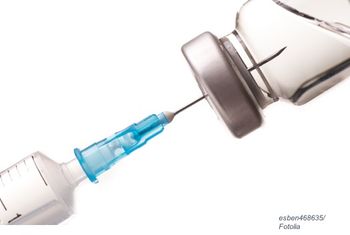
Post-discharge decolonization education and bioburden reduction could be critical to reducing MRSA infections.

Post-discharge decolonization education and bioburden reduction could be critical to reducing MRSA infections.

Hospitals that try to discourage the use of fluoroquinolones succeed at lowering prescriptions for patients admitted to the hospital, but many of those patients still leave with prescriptions for fluoroquinolones at discharge.

From the London Patient to the DISCOVER trial and everything in between, HIV experts provide their biggest takeaways from CROI 2019.

Responses to 10 university-based outbreaks of meningococcal disease caused by serogroup B underscored the importance of MenB vaccination coverage to protect students.

The first study to evaluate the cost-effectiveness of hepatitis C virus (HCV) screening among pregnant women in the US in the era of direct-acting antiviral (DAA) treatment demonstrates that it would be "highly" cost effective, even in states with low HCV prevalence.

Countries around the world begin to respond to measles outbreaks, with Italy taking the step of keeping unvaccinated kids home from school.

Kristine Erlandson, MD, MS, shares her findings on the connection between obesity and neurocognitive decline in persons with HIV.

Short-term investments in pre-exposure prophylaxis (PrEP) are predicted to result in long-term cost-savings and promote significant health benefits following its distribution in Germany, according to a new modelling study in Eurosurveillance.

In a symposium at CROI 2019, Jean-Michele Molina, MD, presented on PrEP failures, highlighting elements of diagnosis, resistance and treatment.

Staph infections aren't going away and now a new report says we're not doing as well as we think.

Monica Gandhi, MD, MPH, discusses antiretroviral options and and treatment decisions for women of reproductive potential.

In a symposium at CROI 2019, Laura Waters, MD, FRCP, presented on the developments of 2-drug regimens for HIV treatments, as well as the questions that remain unanswered.

Persistence on HIV pre-exposure prophylaxis drops off dramatically over a 2-year time period, with only 2 out of 5 users persisting on the treatment, according to a recent study from Emory University.

Susan Swindells, MBBS, discusses the ATLAS trial evaluating long-acting intramuscular injections of cabotegravir/rilpivrine in treatment-experienced individuals.

A new study examining tuberculosis and HIV coinfection in patients in Latin America has found that those with TB had higher mortality rates over the course of a decade, despite successful TB treatment.

We’ve rounded up a list of important US Food and Drug Administration (FDA) and US Department of Agriculture (USDA) recalls from this past week.

Stay up-to-date on the latest infectious disease news by checking out our top 5 articles of the week.

It’s become a serious global health threat, and now a new study investigating 9 cases of Candida auris infections in Brooklyn highlights the importance of quickly identifying these fungal infections.

Lynne Mofenson, MD, spoke to Contagion® in an exclusive interview to explain what the current data suggest on the impact of antiretroviral therapy on maternal health and pregnancy outcomes.

Pietro Vernazza, MD, discusses his presentation on the scientific underpinnings of U=U 11 years after issuing the Swiss Statement

GS-6207’s resistance and pharmacokinetic profile make it a suitable candidate for low-dose, long-acting administration to treat HIV-1 infections, a study finds.

GS-9131, a novel nucleoside reverse transcriptase inhibitor, is a promising antiretroviral candidate for individuals displaying resistance to other NRTIs.

A fast switch to second-line ART after observation of elevated VL or CD4

The opioid overdose death rate for persons living with HIV was 42.7% greater in 2015 than in 2011 even though the total death rate among HIV-diagnosed individuals decreased.

The FLAIR trial evaluated whether a switch to monthly long-acting injectable cabotegravir /rilpivirine is non-inferior to oral dolutegravir/ abacavir /lamivudine in treatment-naive adults.

The ATLAS trial evaluated whether a switch to monthly long-acting injectable cabotegravir/rilpivirine is non-inferior to continued 3-drug oral antiretroviral therapy in virologically suppressed adults.

Saye Khoo, MD, lead presenter of DOLPHIN-2, explains the details of the research on the differences between efavirenz regimen and dolutegravir when initatied during the third trimester of pregnancy.

The HPV vaccine appears to be doing what it was intended to do—lowering rates of cervical cancer, particularly HPV types 16 and 18, responsible for most cases worldwide.

A study reports that weight gain in individuals on ART was associated with lower BMI, reduced proportion of hypogonadism, increased proportion of psychiatric disorders, and non-PI-containing regimens.

A study characterizes the genotypic profile and the phenotypic susceptibility to temsavir in patients with multidrug resistant HIV who could be candidates for fostemsavir.